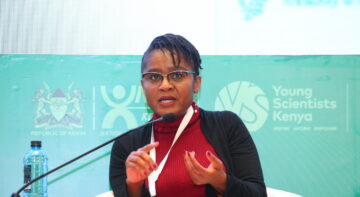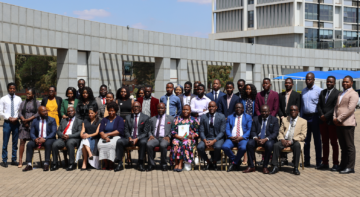Blogs

The African Institute for Development Policy (AFIDEP) in collaboration with the Kenya Ministry of Health and Parliament has, over the last three years, implemented the Strengthening Capacity to Use Research Evidence in Health Policy (SECURE Health) programme. The programme was set up in early 2014 to optimise individual and institutional capacity in accessing and utilising research evidence in decision-making in Kenya. To realise this goal, SECURE Health has implemented a wide range of interventions within the Ministry of Health and Parliament aimed at strengthening institutional leadership and capacity as well as individual technical capacity to find and apply evidence in decision-making. The programme implementation was through a consortium led by AFIDEP, comprising FHI 360, ECSA-Health Community, Consortium for National Health Research, the United Kingdom Parliamentary Office of Science & Technology (UK POST and was funded by the UK Department for International Development (DFID).
As the programme comes to an end AFIDEP in collaboration with the Ministry of Health and Parliament of Kenya hosted a learning forum on 22nd February 2017 at the Intercontinental Hotel in Nairobi, to deliberate lessons from implementation. The event was dabbed “Strengthening capacity for increased evidence use in decision-making: Sharing practical lessons and tools.” Among the key interventions implemented by the SECURE Health programme included sustained advocacy with top leaders on prioritising investments and structural reforms that enable evidence use, hosting of regular dialogues to discuss evidence on urgent health issues, development of guidelines for evidence use in policy-making, development of a policy framework and priorities for guiding the generation and application of research for health in Kenya, and implementation of a comprehensive training and mentorship programme on evidence-informed policymaking. Some of these interventions have been very successful in improving capacity and motivation to use evidence, while others have not. The documented experiences and lessons drawn from the implementation of the SECURE Health programme were shared by all present.
Dr. Charles Nzioka, Head of the Health Research and Development Unit remarked that in order to attain the highest possible standard of health in a responsible manner, evidence “ informed decisions need to be made so that healthcare can be of quality, equitable,, affordable , and accessible to all.
Mr. Bonnie Mathooko, Chief Research Officer, Parliament noted “Partnership with AFIDEP has made it possible for us to crystallise our evidence informed decision-making dream.” Further, Dr. Soti Head of Preventive and Promotive Health Services, Ministry of Health, speaking on behalf of the Director Medical Services said, “The project was a successful and we need to make it more successful by ensuring an evidence-informed decision-making norm.”
The Programme manager Dr. Rose Oronje, also Director, Science Communications and Evidence Uptake, AFIDEP, gave a brief on the programme impact and also provided a roadmap for operationalising evidence use in the Ministry of Health and Parliament of Kenya, in order to enable the two institutions maximise returns on EIPM. She emphasised that building a culture of evidence takes a while and therefore needs long-term investments. Dr. Oronje further noted that there are several challenges that need to be overcome “ particularly with regard to strengthening institutions as there are many bottlenecks. She also pointed that ownership of such a programme among relevant stakeholders is critical to success.
During the event there was a panel discussion that focused on the question, “How do we entrench evidence use in decision- making and accountability mechanisms in Kenya?” The members of the panel were, “Honorable Susan Musyoka, MP and Chair of the Parliamentary Caucus on Evidence-Informed Oversight, Dr. Peter Cherutich, Head Monitoring and Evaluation, Research and Health Informatics, Dr. Peter Githaiga Mwitari, Head Knowledge Management KEMRI and Mr. Aloyce Ratemo, Principal Economist, Ministry of Devolution and Planning. The Panel was moderated by Dr. Eliya Zulu, Executive Director, AFIDEP.. From the discussions it was quite evident that increased use of evidence is crucial to the decisions being made by Parliamentarians. Decisions have far-reaching consequences and the ecosystem of facilitating the use of evidence has quite a number of players in the linkage between the researchers and policymakers. Therefore, there needs to be mechanisms to bridge this gap and have a proper communication and transition of research to policy.
As the panel discussion came to a close, it was clear that evidence is critical to sound decision-making. However, users of evidence should be cognisant of the fact that not all evidence is good evidence, therefore evidence must be appraised to ensure it is of value in decision-making processes.
As a wrap up to the discussion, Dr. Zulu pointed that evidence-informed decision-making is critical for the achievement of the sustainable development goals (SDGs) and Agenda 2063. Share on X “Evidence-informed decision-making is about not leaving anyone behind,” he said.
Related Posts





